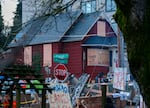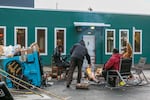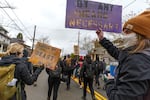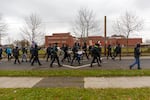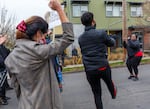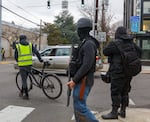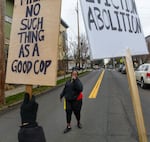In the early 1970s, Portland’s urban development agency destroyed the homes of 171 families to make room for a hospital expansion that never happened.
Half a century later, following months of racial justice protests and a week that saw the ”Red House” protests shine an intense spotlight on the issue of gentrification in the city’s historically Black Albina neighborhood, some descendants of the area’s displaced families are making a renewed push for reparations.

Of the 171 households forced out by the city through eminent domain between 1971-1973 to pave the way for the expansion of Emanuel Hospital, nearly three quarters were Black. One-third owned their homes.
Courtesy of EDPA2
The group, called the Emanuel Displaced Persons Association 2 or EDPA2, planned to ask the Portland City Council for some form of compensation midday Wednesday. That request will take place as council members consider making changes to an urban renewal zone that encompasses parcels of land ripped from the families in the ’70s for the proposed 55-acre expansion. The city is weighing increasing the “maximum indebtedness” of the zone — effectively increasing the amount of money Portland can generate for projects around Interstate 5.
A yes-vote by the council would let the city tap into an additional $67 million, which Portland leaders say would be funneled to build more desperately needed affordable housing in the area and reverse the area’s ugly history of displacement. But some descendants of the displaced families argue the city should not be able to profit from the land until those who were forced out half-a-century ago are compensated.
“What happened to our families, to me, is the equivalent of murder. ... It’s real estate massacre” said Byrd, a North Portland native and founding member of EDPA2, who goes only by one name. “We’re going to leave those folks damaged and harmed but we’re going to pay those offenders again? We’re going to award offenders $67 million with no consideration of the people who were impacted?”
Byrd said her grandparents were one of the many households displaced after Emanuel Hospital, now called Legacy Emanuel Medical Center, decided to expand into the heart of the bustling Black neighborhood. At the time, racist lending practices meant the area was one of the only places in Portland where Black families could own property. Of the 171 households forced out by the city through eminent domain between 1971-1973, nearly three quarters were Black, and a third owned their homes.
Homes promised, and never built
Byrd’s grandmother, Esther Douglas, owned a home on 253 N. Fargo. Her grandfather, Charlie Douglas, owned a tavern called Doug’s Place. Both were bulldozed in the early 1970s after the Portland Development Commission, the city’s urban renewal agency now called Prosper Portland, condemned and demolished properties throughout the neighborhood to pave the way for a hospital expansion that never occurred. The funding for the build out dried up before the hospital could build on the vacant lots — at which point, the once-thriving community had been decimated.
Under an agreement struck in 1971 between impacted households and city stakeholders, displaced families were promised a new home for every one demolished. Those homes were never built, though the city said it has since fulfilled the affordable housing requirements. In a May letter to EDPA2, Prosper Portland Executive Director Kimberly Branam and Chair Gustavo J. Cruz Jr. wrote that the city had far surpassed the 180 to 300 affordable units agreed upon, creating nearly 2,500 units in inner North and Northeast Portland in the last two decades.
But Byrd said many families directly displaced never got these homes, and believes the council now has a responsibility to settle the matter through reparations. She said she’s open to different ideas of what these reparations could look like, including direct payments to the descendants of families.
“Wouldn’t that be an obvious consideration?” asked Byrd. “If you destroyed my granddaddy’s tavern, how much revenue did we miss out on potentially from that time until now — 40 plus years?”
City leaders say the money is already earmarked to address the history of displacement in North and Northeast Portland. Shannon Callahan, the head of Portland’s housing bureau, said 70% of the $67 million that would be made available would go to affordable housing in the area with priority for families who have been subject to eminent domain. The projects are part of the bureau’s N/NE Neighborhood Housing Strategy, a city-initiative to reverse the area’s long legacy of displacement
“We are slated to create new affordable rental homes and home ownership opportunities,” Callahan said. “Those home opportunities are prioritized first for families who have generational ties to the neighborhood and/or families who were subject to displacement action taken by the city through the past decades.”
Ed Johnson, the director of litigation for Oregon Law Center, which is representing EDPA2 alongside Legal Aid Services of Oregon, said affordable housing, while critically needed in the city, does little to replace the opportunity the families lost to build wealth through home ownership.
“Affordable housing is not the remedy to what happened to these specific families because you can’t build wealth in affordable housing you don’t own,” said Johnson. “It gives you a roof over your head, which can save your life. But in terms of what happened, what would make that wrong right, it’s like apples and oranges.”
Before the council looks to generate cash from the land, Johnson said, he believes the council needs to focus on fulfilling lingering promises made to these families — a thorny conversation the council has so far seemed unwilling to take up.
“There may be a time down the road where urban renewal money can be used again to leverage money off of this land,” he said. “But the city has unfinished business with these families that needs to be dealt with first.”
‘Two separate issues,’ as reparations, affordable housing collide
Not all with direct ties to the ill-fated project feel this is the forum to address this business, however. Dr. Steven Holt is both a descendant of a family displaced by the proposed expansion — his mother lived in a home that was destroyed on North Monroe — and he chairs the N/NE Oversight Committee, which oversees the implementation of the city’s strategy to address displacement in the area. Holt said he feels a massive opportunity to create affordable homes has grown clouded by a narrow discussion on righting historic harms.
“These are two separate issues. We’re not talking about the disregard of the people who have been impacted. That’s not what this conversation is about,” Holt said. “We’re talking about creating opportunities for the entire community that’s been impacted. EDP2 is talking about a specific group.”
The majority of land that composes the Interstate Corridor Urban Renewal Area, which encompasses 4,000 acres spread out over 17 neighborhoods in North and Northeast Portland, does not include parcels of land that were part of the proposed hospital expansion. However, much of the recent debate has centered around one block of land that was: a parcel that borders Williams and Russell. Known as the Hill Block, the site serves as a particularly egregious example of what the community lost and the nothingness that replaced it. Once the heart of the neighborhood, the block has remained vacant ever since it was bulldozed for the hospital.
Branam, the head of Prosper Portland, said the agency’s board voted in February to include the block within the urban renewal district. And while Callahan, the head of the housing bureau, said the city plans to use a chunk of the new funds for affordable housing on the block, some advising on the process express skepticism that Black families would benefit.
“As you go northward on the street, it’s very developed condos, high rises, expensive businesses that Black people can’t afford or can’t afford to shop at. By doing this they’ll make this little area, Russell and Williams look just like the rest of the street,” said Quinton Blanton, co-chair of the North/Northeast Community Development Initiative, an advisory board tasked with reviewing projects proposed within the urban renewal area around Interstate 5.
“It’ll be as unaffordable and it’ll be the last leg of gentrification. The final blow to the city’s Black community.”

